Binge-watching often stems from your need for emotional escape, connection, or stimulation, fueled by engaging stories and easy access on streaming platforms. It activates your brain’s reward system, making it tempting to watch longer. While it can improve mood temporarily, it also increases risks of mental health issues like anxiety, depression, and feelings of loneliness, along with physical effects such as fatigue and poor posture. Understanding these factors can help you find healthier ways to enjoy entertainment—keep exploring to learn more.
Key Takeaways
- Binge-watching provides emotional escape, deep narrative engagement, and fulfills needs for connection, driven by psychological factors like empathy and neuroticism.
- It activates the brain’s reward system, releasing dopamine, which reinforces viewing habits and may lead to addictive behaviors.
- Excessive binge-watching is linked to mental health issues such as depression and anxiety, often worsening over time.
- Prolonged sedentary behavior during binge sessions can cause physical health problems like obesity, muscle strain, and disrupted sleep.
- Strategies like setting time limits and incorporating breaks can promote healthier viewing habits and overall emotional well-being.
Understanding the Rise of Binge-Watching in Modern Media Consumption
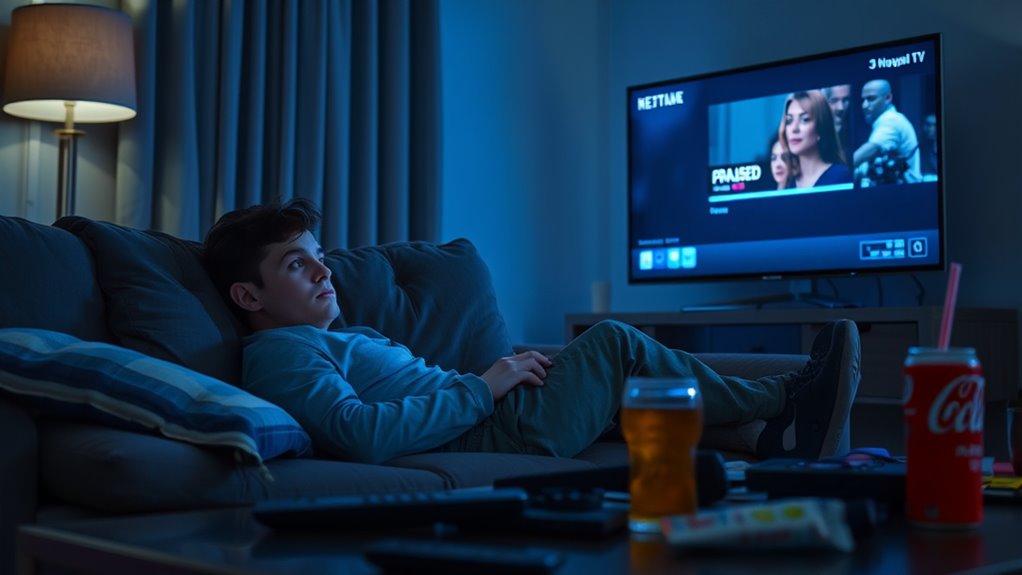
The rise of binge-watching is a clear reflection of how modern media consumption has transformed over the past decade. Streaming platforms like Netflix, Hulu, and Amazon Prime have revolutionized access to content, making entire seasons available at once. Nearly 99% of U.S. households subscribe to at least one service, highlighting how ingrained this behavior has become. With an average of 21 hours spent weekly on digital media, binge-watching dominates TV habits. The convenience of on-demand viewing allows you to watch multiple episodes in rapid succession, often in one sitting. This shift is driven by technological advances, increased content diversity, and changing viewer expectations. As a result, binge-watching has become a primary way many people engage with entertainment, reflecting broader changes in how media fits into daily life. Market growth projected at over 40% CAGR in AI tech by 2025 illustrates how technological innovations continue to shape media consumption habits.
Psychological Motivations Behind Binge-Viewing Behaviors
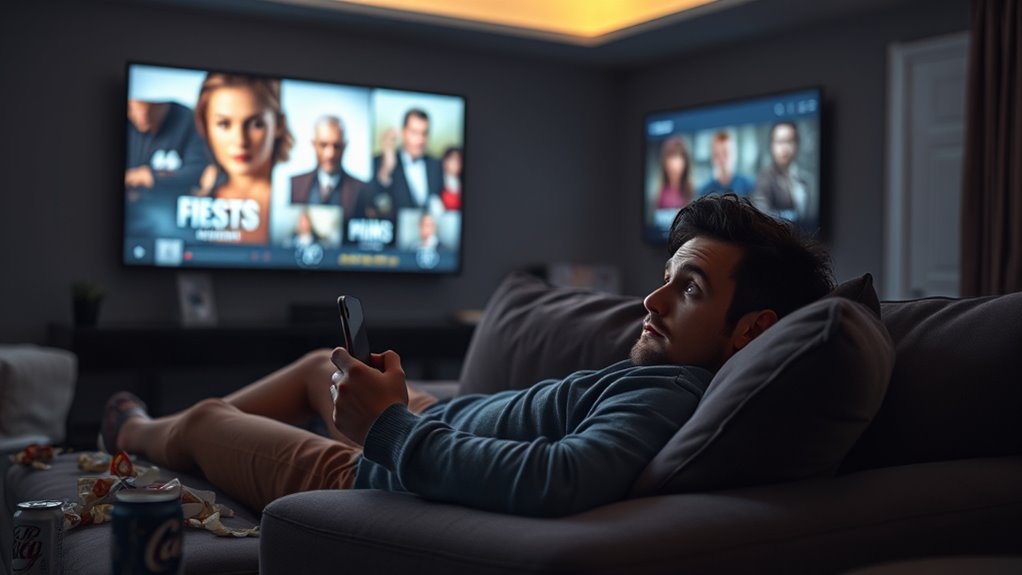
You watch because you want to escape from stress or daily problems, seeking relief through immersive stories. Your need for emotional engagement drives you to become deeply transported into the narrative, making it hard to stop. Additionally, your ability to empathize with fictional characters fuels your identification with their experiences, reinforcing your binge-watching habits. The safety features of streaming platforms and viewing devices also contribute to your comfort, encouraging prolonged viewing sessions.
Escape From Stress
Why do so many turn to binge-watching as a form of escape? When daily life feels overwhelming or stressful, binge-watching offers a quick refuge. It allows you to immerse yourself in a different world, temporarily forgetting your worries and real-life problems. Watching multiple episodes provides a sense of control and distraction, helping you feel momentarily relieved from stress’s grip. This behavior taps into your desire for escapism, giving you a break from emotional or mental strain. The narrative transport and emotional engagement with characters create a comforting detachment from personal issues. Over time, binge-watching can become a habitual way to cope, offering a soothing escape whenever stress levels spike, even if it doesn’t address the root causes of your stress. Additionally, engaging with high-quality projectors can enhance the viewing experience, making it even more immersive and comforting.
Emotional Immersion Need
Emotional immersion serves as a powerful psychological driver behind binge-watching, as viewers seek to connect deeply with fictional worlds and characters. When you become emotionally transported, you experience a sense of escape, excitement, or comfort that keeps you glued to the screen. This need for immersion satisfies your desire for intense engagement, making the story feel real and personal. To enhance this experience, you might:
- Identify strongly with characters’ emotions and struggles.
- Lose track of time as you get absorbed in the plot.
- Feel a sense of companionship through fictional relationships.
- Use the story as a way to regulate your mood or avoid real-life stress.
- Recognizing patterns in recurring numbers, such as feeling drawn to certain themes or symbols, can deepen your understanding of your emotional responses and spiritual messages.
This craving for emotional engagement explains why binge-watching often becomes a habitual way to seek fulfillment and distraction.
Empathy and Identification
Empathy and identification play a significant role in fueling binge-watching habits by deepening your emotional connections to fictional characters and stories. When you relate strongly to characters, you experience their joys, struggles, and emotions as if they were your own. This emotional immersion makes it easier to stay engaged, often leading you to watch multiple episodes to follow their journeys. Your ability to see yourself in their experiences enhances narrative transportation, making the stories feel personal. If you have high empathy, you’re more likely to seek out these connections intentionally, which can increase your binge-watching frequency. This emotional bond provides comfort, escapism, and a sense of belonging, reinforcing your desire to continue watching. Additionally, engaging in mindful reflection about your viewing habits can help you recognize when your binge-watching may be serving as a form of emotional regulation or mindfulness practice, encouraging healthier viewing patterns. Ultimately, empathy and identification make binge-watching a compelling way to fulfill emotional needs.
Personality Traits and Individual Differences in Binge-Watching Tendencies
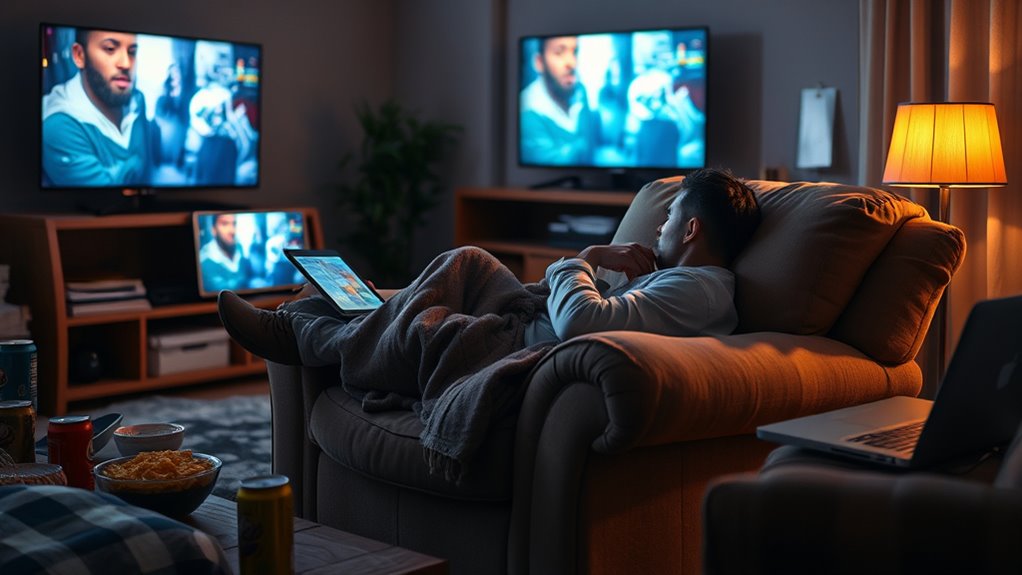
Personality traits play a significant role in determining binge-watching tendencies, with certain dispositions making individuals more prone to engaging in prolonged viewing sessions. Your traits influence how likely you are to binge-watch and how problematic it might become. For example:
Personality traits significantly influence binge-watching habits and potential risks.
- Higher neuroticism can lead you to seek comfort through binge-watching, especially during stressful times.
- Low conscientiousness may cause procrastination and difficulty managing time, making binge sessions more frequent.
- Impulsivity increases your likelihood to start and continue watching without control.
- A strong capacity for fantasy empathy makes you more emotionally immersed, fueling repeated binge-watching.
Understanding these traits helps explain why some people are more prone to binge-watching and how individual differences shape habits and potential risks.
The Link Between Binge-Watching and Mental Health Challenges

You might notice that binge-watching often correlates with feelings of depression and anxiety, especially when used as an emotional escape. This behavior can temporarily soothe distress but may worsen mental health over time, creating a cycle of reliance and emotional imbalance. Recognizing these patterns can help you understand how coping mechanisms through binge-watching impact your emotional well-being. Additionally, engaging in healthier activities, like mindful relaxation, can serve as more effective strategies for managing stress and emotional challenges.
Emotional Well-being Impact
Binge-watching, while often seen as a harmless way to unwind, can have significant effects on emotional well-being. It may temporarily boost mood but can also lead to negative feelings over time. Here’s what you should know:
- You might feel regret or guilt afterward, especially if binge-watching replaces other fulfilling activities.
- It can increase feelings of loneliness, as excessive viewing often isolates you from social interactions.
- Prolonged sessions may heighten stress and anxiety, worsening your overall mental state.
- Relying on binge-watching for emotional escape can prevent you from addressing underlying issues, deepening emotional distress.
- The use of certain tools and understanding the product features of your devices can influence how easily you lose track of time during these sessions.
Being aware of these effects helps you maintain a healthier balance and protect your emotional well-being.
Coping and Anxiety
Many individuals turn to binge-watching as a way to cope with stress and emotional difficulties, but this behavior can actually reinforce anxiety rather than alleviate it. When you binge-watch to escape, you might temporarily distract yourself, but it often leads to feelings of guilt, regret, or increased worry afterward. This cycle can deepen your anxiety, making it harder to address underlying problems. Binge-watching can also create a false sense of control, preventing you from facing issues directly. Over time, reliance on this habit may worsen your mental health, fueling feelings of loneliness and helplessness. Recognizing this pattern is essential. Instead of using binge-watching as a primary coping strategy, consider healthier ways to manage anxiety, like mindfulness, exercise, or seeking support. Additionally, understanding the psychology behind binge-watching can help you develop better coping mechanisms.
The Addictive Nature of Binge-Watching and Its Neural Implications
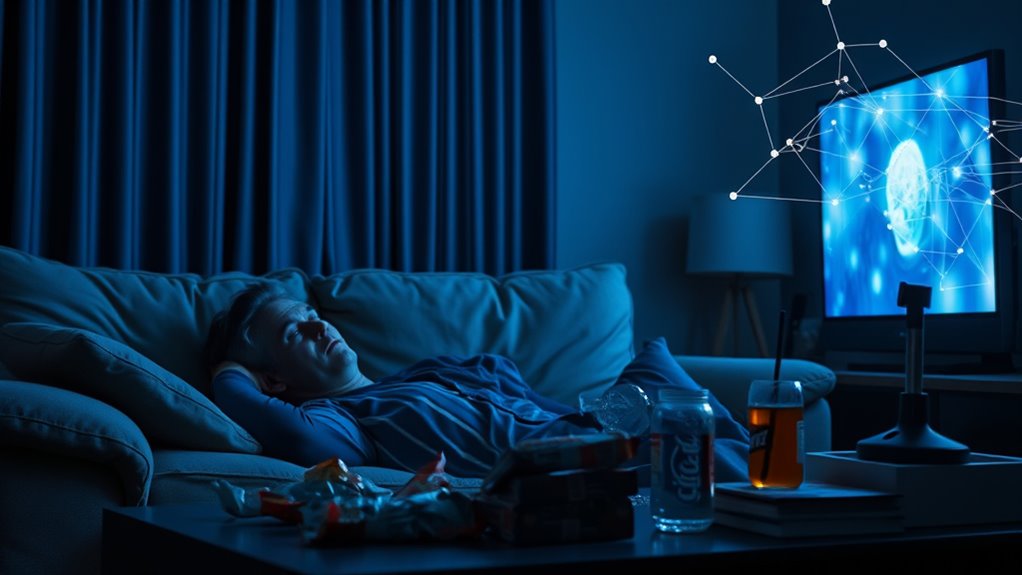
The addictive qualities of binge-watching stem from the way it activates the brain’s reward system, releasing dopamine with each episode. This surge reinforces the behavior, making you crave more. Over time, repeated exposure strengthens neural pathways, making binge-watching habitual and harder to stop. As your brain adapts, you may need longer viewing sessions to achieve the same pleasure, a sign of developing addiction. You might also experience decreased impulse control, making it tough to pause. Here’s what happens:
Binge-watching rewires your brain, making stopping increasingly difficult over time.
- Dopamine release reinforces viewing habits.
- Neural pathways become more ingrained with repeated binge sessions.
- Tolerance develops, requiring longer or more frequent binges.
- Reduced self-control increases difficulty breaking the cycle.
This neural pattern explains why binge-watching can feel compulsive and hard to quit.
Physical Health Consequences Associated With Excessive Streaming
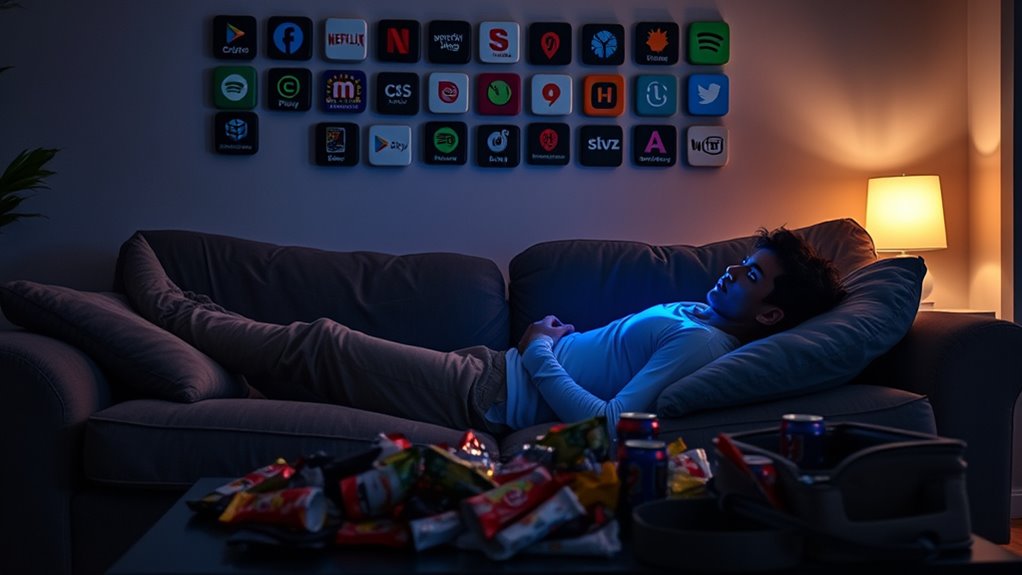
Excessive streaming often leads to significant physical health issues, primarily because it encourages prolonged sedentary behavior. When you binge-watch for hours, you remain seated, which can impair circulation, cause muscle stiffness, and increase the risk of obesity. Sitting for extended periods also strains your back, neck, and shoulders, leading to discomfort and potential chronic pain. The displacement of physical activity reduces your overall fitness levels and weakens cardiovascular health. Additionally, late-night binge-watching can disrupt sleep patterns, causing fatigue and impairing immune function. Over time, these habits contribute to metabolic problems, including higher blood sugar and cholesterol levels. While streaming provides entertainment, excessive consumption without movement can negatively impact your physical well-being, emphasizing the importance of balancing screen time with activity. Incorporating somatic therapy techniques like movement therapy or breathwork can help mitigate some of these physical issues by promoting relaxation and body awareness.
Strategies for Managing Binge-Watching and Promoting Well-Being

To effectively manage your binge-watching habits and support your overall well-being, you need to establish clear boundaries and incorporate healthier routines. Start by setting time limits for viewing sessions to prevent excessive episodes. Second, create a designated viewing schedule to balance entertainment with other activities. Third, incorporate regular breaks—stand, stretch, or walk to reduce sedentary effects. Lastly, replace some binge-watching time with engaging hobbies, social interactions, or physical activity. These strategies help you regain control, reduce negative health impacts, and improve mental health. Staying mindful of your habits encourages healthier consumption patterns. Remember, moderation is key, and small changes can make a significant difference in maintaining a balanced, fulfilling lifestyle.
Frequently Asked Questions
How Can I Identify if My Binge-Watching Is Problematic?
If your binge-watching starts to interfere with daily responsibilities, sleep, or social life, it’s likely problematic. Notice if you feel guilty, anxious, or regretful afterward, or if you need longer viewing sessions to feel satisfied. Impulsivity, low self-control, or hiding your habits from others are signs. When binge-watching affects your mental health, relationships, or goals, it’s time to contemplate setting limits and seeking support.
Are There Effective Interventions to Reduce Binge-Watching Habits?
You can try setting strict time limits before watching, using alarms or app blockers to restrict viewing duration. Establish designated viewing times and replace binge-watching with healthier activities like exercise or socializing. Practice mindfulness to recognize triggers and emotional needs behind your habits. Seeking support from a mental health professional can help address underlying issues, develop healthier routines, and reduce the urge to binge-watch excessively.
Does Binge-Watching Have Long-Term Impacts on Brain Function?
You might find it surprising, but binge-watching can have long-term impacts on brain function. Repeatedly engaging in this behavior reinforces neural pathways associated with reward and habit formation, potentially leading to increased impulsivity and decreased self-control. Over time, it may impair your ability to focus, regulate emotions, or resist temptations. These changes can make it harder to prioritize goals, affecting mental resilience and overall cognitive health in the long run.
Can Binge-Watching Be Beneficial for Mental Health?
Binge-watching can offer temporary mental health benefits like stress relief, escapism, and mood improvement, especially after a tough day. It helps you unwind and connect with stories, providing emotional comfort. However, moderation is key. Overdoing it might lead to increased anxiety or depression. So, enjoy binge-watching mindfully, balancing it with other healthy activities to maximize its positive effects and avoid potential negative impacts on your mental health.
What Role Do Streaming Algorithms Play in Promoting Binge Behaviors?
Streaming algorithms play a significant role in promoting binge behaviors by recommending content tailored to your viewing habits. For example, if you finish a gripping drama, the algorithm quickly suggests similar shows, encouraging you to keep watching. This personalized approach keeps you engaged longer, making it easier to lose track of time and binge multiple episodes. By continuously feeding your preferences, these algorithms subtly reinforce compulsive viewing patterns.
Conclusion
As you consider your binge-watching habits, remember that nearly 60% of adults report watching multiple episodes in one sitting. While it can be a fun escape, it’s important to stay mindful of its impact on your mental and physical health. By setting limits and taking breaks, you can enjoy your favorite shows without compromising your well-being. Balance is key to making streaming a healthy part of your life.










